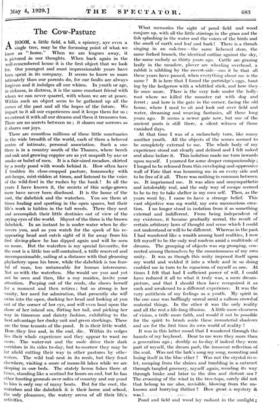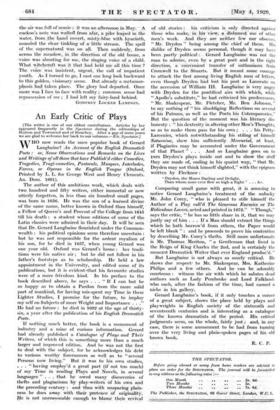The Cow-Pasture A ROOM, a_ little field, a hill, a spinney,
aye even a single tree, may be the focussing point of what. we know as ".home." When we are leagues away, it . is pictured in our thoughts. When back again in the well-remembered house it is the first object that we look for. Our youngest and most impressionable years have been spent in its company. It seems to know us more intimately than our parents_ do, for our faults are always forgiven and it indulges all our whims. In youth or age, in sickness, in distress, it is the same :constant friend with whom we can never quarrel, with whom we are at peace. • Within such an object seem to be gathered up all the scenes of.the past and all the hopes of the future. We impart to it all our experiences and it keeps them kr. us ; ice entrust it, with all our dreams and these it treasures too. There are no secrets between us ; _ it shares our sorrows as it shares our _joys. .
There are countless millions of -these little sanctuaries in the-wide breadth of the world, each of them a beloved centre- of intimate, personal association. Such a one- there is in a country -south. of. the Thames, where beech and oak and growing coppice are as yet unspoilt by axe- or smoke or babel of men. It is a fair-sizectmeadow, skirted by a reedy-pond with woods behind it. How often have I trodden its -close-cropped pasture, hummocky with ant-heaps, mist-ridden at times, and listened to the voice of the wild-fowl in the rushes by the bank / In all the years I -have known it, the secrets of this sedge-grown mere have never- been disclosed. It is the home of the coot, the dabchick and the waterhen. You • see them at times feeding and sporting in the open spaces, but their- life's work is hidden in the tall weeds. There they nest and accomplish their- -little destinies out of view of the prying eyes of the world. Shyest of the three is the brown dabchick: In an -instant he is under. water when he dis- covers you, and as you watch for -the speck of his re- appearing head and- catch sight -of it far away from his fast - diving-place he has dipped again- and will be- seen no more. But- the waterhen is my special favourite, for the coot is a little too self-contained, a trifle reserved and - tmcompanionable, sailing at a distance with that gleaming phylactery- upon his brow, while the dabchick -is too fear- ful of man,. too untameable -for human - intercourse. Not so with the waterhen. She would see you and yet - not be seen and then, like a coy maiden, -invite your attention, - Peeping out -of the reeds, -she shows herself for a moment and then retires ; but so strong- is her vanity, her need for admiration, that presently she will swim into the -open, ducking her- head and looking at you out of the corner of her eye, and will even land upon the _ shore of her-inland sea, flirting her tail, and picking- her way in timorous and dainty fashion, exhibiting to the best advantage her dusky-suit and green-stockings. These are the :true tenants-of the. pond. It is their little world. Here-they live and, in the end, die.. Within its sedges lies their whole experience and they appear to want no more. The water-rat and the mole drive their dark corridors in its sides to-day, but to-morrow they may be far afield cutting their way in-other pastures by other waters. The wild teal- nest- in its reeds, but they feast elsewhere, .yisiting a score of moon-lit lakes while we are sleeping- in -our- beds. The stately heron fishes there at times, standing-like a sentinel for hours on-end, but he has, other hunting grounds over miles of country and our pond to him is only one of many beats.. But for the coot, the wate,rhen and the dabchick it is their- home and school„ the only pleasance, the watery arena of all their life's. activities. What memories the sight of pond - field and wood conjure up, with all the little stirrings in the grass and the fish splashing in the water and the voices of the birds and- the smell of earth and leaf and bark!- There is a thrush - singing . in an oak-tree the same lichened stem, the same forked branch, the identical outline against-the sky, the-same melody as thirty years ago. Cattle are grazing lazily in the meadow, plover are wheeling overhead, a rabbit is nibbling by the covert-side--can it be, that all these years have passed, when everything about me is the . same ? It is here that I found the partridge's eggs, hunt ing by the hedgerow with a whittled stick, and here they •. lie once more. There is the very hole under the holly- root where we killed the -monster rat with dog and ferret ; and here is the gate in the corner, facing the old house, where I used to sit and look out over field and water, dreaming and weaving -fantasies, all these long years ago. It seems -a newer gate now, but one of the ancient posts is still there, a -silent witness of those vanished days.
At that time I was of .a melancholy turn, like many another youth. All the objects of the senses seemed to be completely external to me. The whole body of my experience stood out clearly and defined and I felt naked and alone before it. This isolation made me turn inwards upon myself. I yearned for some deeper companionship ; I longed to be released from this enveloping and oppressive wall of Fate that was hemming me in on every side and to be free of it all. There was nothing in common between us. It imprisoned me. It was alien and unsympathetic and intolerably real, and the only way of escape seemed to be to try to take shelter in my own self. Then, as the years went by, I came to have a strange belief. This vast objective was my world, my own unconscious crea- tion. I no longer stood in isolation from it as something external and indifferent. From being independent of my existence, it became gradually unreal, the result of certain arbitrary laws of thought and sense which I. could not understand or will to be different. Whereas in the, past I had wandered like a wraith among hard realities, I now felt myself to be the only real nucleus amid a multitude of dreams. The grouping of objects was my grouping, con- nected among themselves by the consciousness of my own unity. It was as though this unity imposed itself upon. my- world and welded it into a whole and in so doing enabled me in turn to be conscious of myself as one. At times I felt •that had I sufficient power of will, I could have reduced it all to what it truly was, a mere dream- picture, and that I should then have recognized it as such and awakened to a different experience. • It was the very antithesis of my feelings as a youth. 'My spirit in the one case was bafflingly unreal amid a callous crowd of. material things. In the other it was the only reality. and all .the rest a life-long illusion. A little more clearness of vision, a trifle more faith, and would it not be.possible for the spirit to brush aside these immaterial shadows and see for the first time its own- world of .reality ? .
. It was in this latter mood that I wandered. through the haunts of my. boyhood. Dear to me were they more than a generation ago ; doubly so to-day. if indeed they, were• part of myself, the dream part; the innocent- reflection of the soul. Was not the lark's song. my song, mounting- and losing itself in the blue ether ? Was not the crystal-rive. let, escaping from the sluiees and tumbling in. a-cataract through tangled greenery, myself again, wending its way through brake and briar. to the dim -and distant -sea ?- The .crooning of the wind in the tree-tops, surely did not that belong to me also, -invisible, blowing from the un- known and hurrying thither ? How great a - mystery it and field and wood lay radiant in the sunlight ; the air was full of music; was an afternoon in May:7A cuckoo's. note was wafted from afar, a pike leaPed water, from hazet'eovert, misty-blue with _hyacinth, sounded the clear tinkling -a alittle stream. The spell of the Superhatotal Was on all Then suddenly, from across the meadow, in the direction of the old house, a -voice was shouting for me,- the ringing voice of a child. What witchcraft was it that had held me all this time ? The voice was insistent, urgent, the call of impatient youth. As I turned to go, I cast one long look backward to this golden; visionary scene. But already a metamor- phosis ,had taken place. The glory had departed. Once I more was face to face with reality ; common sense had repossession of me ; I had left my fairy-land behind.
GODERF,Y LOCKER LAMPSON.























































 Previous page
Previous page